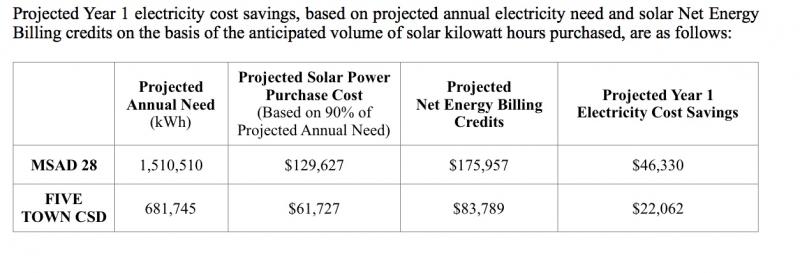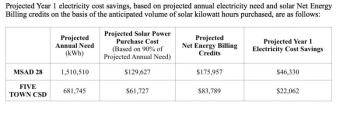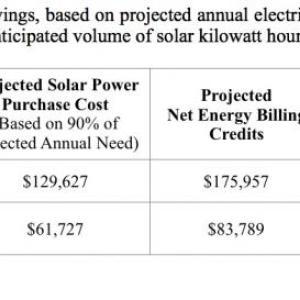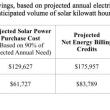Camden-Rockport school board, Five Town CSD green-light solar power contract
CAMDEN — Slowly but surely, the Five Town CSD (governing Camden Hills Regional High School) and School Administrative District 28 (Camden-Rockport K-8) are reducing their carbon footprint. With wastewater thermal heat to run through pipes to the new middle school, with heat pumps installed below the building, solar panels on the roof at Camden Hills Regional High School, as well as an older generation geothermal heat system at the high school, there is a persistent focus on using alternative power and heat in the facilities.
On Dec. 4, the two districts took another step toward their collective goal, as articulated at an Oct. 16 SAD 28 meeting, to make its “buildings to be be emission-free powered schools.” Voting unanimously, the boards agreed to sign a solar power purchase agreement (PPA) with a third party, Camden Solar LLC, which in turn will purchase power from solar farms in western Maine.
The goal is also to reduce electricity and heating costs throughout the two school systems. The PPAs, and in purchasing solar power as presented, are estimated to save SAD 28 $46,330 in electrical costs the first year of operation and the CSD $22,062, according to calculations included with the PPAs.
With the PPAs, two school districts, representing taxpayers of Appleton, Camden, Hope, Lincolnville and Rockport, are doing business with a solar power consortium that includes privately owned companies ReVision Energy and the New York City-based investment group Aligned Climate Capital 2 LLC, acting locally as Camden Solar LLC. Aligned Climate Capital LLC is the investor in the two Maine solar farms in Western Maine, while ReVision is in installer. Another private company, Constellation New Energy, is also in the mix, which currently holds the retail contract for the districts’ power purchase.
In July, Aligned Climate Capital LLC and ReVision had proposed building a solar farm on a wooded section of the 100-acre Camden Hills Regional High School Route 90, Rockport, land. However, the wetlands there posed logistical hurdles so the effort redirected to offsite possibilities.
A solar farm in Livermore Falls was suggested, as well as another one in Skowhegan. The goal is to be online by Dec. 31, 2020 at either location.
The agreement, as outlined for the sites, specifies that the two districts would purchase a percentage of total project power, with SAD 28 buying approximately 42% of the output, and Five Town CSD approximately 20%. Another school district, RSU 73, is also interested in buying the rest of the solar power generated there.
In turn, the districts are to receive a power credit on their CMP bill, according to Dec. 4 meeting minutes.
The Livermore Falls solar farm is intended for construction on an actual farm.
While the facility in Livermore Falls or Skowhegan is anticipated to produce 3.3 million kilowatt hours, the PPA agreement said: “Recognizing the speculative nature of purchasing electricity and Net Energy Billing credits on a long-term basis and in light of the variables that can affect electricity costs and electricity savings—including the risk of standard electric rate fluctuations, Net Energy Billing tariff rate fluctuations, increases or decreases to the output of the solar system, and unanticipated electricity usage reductions by the school unit—the total projected annual need was reduced to 90% to minimize the risk of over-purchasing solar credits in any given year. The Estimated Purchaser’s Percentage was calculated based on a system size of 3,300,000 kilowatt hour (kWh) output.”
At the Dec. 4 meeting, one board member expressed concern that the farmland would no longer be working as a farm, according to the minutes.
The farmer, according to the minutes: “cannot afford to keep the farm in the family once he is gone and sees the solar farm as a way to save the farm. The money from the leased land will allow his family to keep the property, much of which won’t be developed at all. The owner asked that RSU 73, the local school district be asked to participate in the project, as well. Kurt [Penny, of ReVision Energy] said using farmland for solar projects is a typical trend until incentives are placed on other property.”
The PPA (see attached PDFs for contracts) constitutes a 20-year term, with an additional five-year term if desired, for both SAD 28 and the Five Town CSD.
The two districts will purchase energy, plus renewable energy certificate (REC), for .94 cents per kilowatt hours. The districts chose to add approximately 5 cents to each kilowatt hour with the purchase of RECs. (See box)
At an Oct. 16 SAD 28 school board meeting, that district articulated its intention to keep RECs and pull, “them off the market to realize those environmental benefits of not having someone else use those recs for dirty power,” said Superintendent Maria Libby.
The board also agreed at the fall meeting that the district wanted to its school buildings to be be emission-free powered schools.
In total, the districts are to use approximately 1.35 million kilowatt hours of energy per year in all of their facilities: Camden-Rockport Elementary School, Camden-Rockport Middle School, Camden Hills Regional High School, the Bus Barn and the Mary E. Taylor Building.
“Anticipated electric energy needs for Maine School Administrative District No. 28 (“MSAD 28”) and the Five Town CSD were calculated by reviewing utility bills over the past three years to determine historical electricity usage within each building,” according to the PPA packet assembled for the boards of the two districts.
“The three-year averages were then adjusted, as follows:
(1) upward adjustment to the new middle school due to installation of water source heat pumps;
(2) downward adjustment to the bus barn due to planned reductions in the number of diesel buses that will need to be plugged in and planned relocation of the MSAD 28 central office out of the bus barn; and
(3) upward adjustment to the Mary E. Taylor (MET) building due to planned relocation of the MSAD 28 central office into the MET building and installation of air source heat pumps.”
The two school boards had convened Dec. 4 for a joint meeting the Chorus Room at Camden Hills Regional High School.
After listening to presentation by the solar PPA proponents, the boards heard from the schools’ attorney Aga Dixon, school law attorney from Drummond Woodsum, who, “explained the commitment involved with the agreement and wanted the board to fully understand the risks and rewards.”
Dixon outlined the process by which the school districts will get reimbursed for their investment: “The net energy billing credit is calculated by multiplying monthly production purchased under the PPA by a Tariff Rate published annually by the Public Utilities Commission,” meeting minutes said. “This credit would be applied to our CMP bill to offset that cost. The credit is greater than the PPA cost. The net difference is the savings we will realize – that will be applied to our CMP bill as a credit.”
The boards voted separately, with both voting unanimously in favor of the motion to authorize a long term solar power purchase, with eight board members in attendance for the CSD vote and six for the SAD 28 vote.
Board members present were:
Becky Flanagan, Chair CSD
Marcia Dietrich, Vice Chair CSD Matt Dailey, Chair SAD
Patrick McCafferty, Vice Chair SAD Jessica Alberti, CSD
Brooks Crane, CSD
Brieanna Gutierrez, CSD, SAD Deborah Harbaugh, CSD
Peter Orne, CSD, SAD
Board Absent
Andrea Palise, CSD
Sarah Bradley Prindiville, CSD, SAD Elizabeth Noble, SAD
Also Present
Maria Libby, Superintendent
Debra McIntyre, Assistant Superintendent
Keith Rose, Director of Operations and Maintenance Scott Pons, Business Manager
Shawn Carlson, Principal
Aga Dixon, Drummond Woodsum
Adam Cote, Drummond Woodsum
Bill Behrens, ReVision Energy
Kurt Penny, ReVision Energy
Reach Editorial Director Lynda Clancy at lyndaclancy@penbaypilot.com; 207-706-6657
Event Date
Address
United States
























